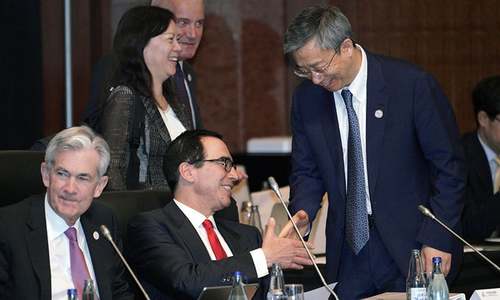FUKUOKA: The world’s top financial policymakers admitted on Sunday that trade tensions had worsened and posed a risk for the global economy, after a G20 meeting that laid bare differences between the United States and other nations.
Following 30 hours of wrangling in what one official described as a “tense” atmosphere, G20 finance minister and central bank chiefs produced a hard-fought final statement acknowledging that “growth remains low and risks remain tilted to the downside.” “Most importantly, trade and geopolitical tensions have intensified,” the G20 said, adding they “stood ready to take further action” if required.
As a compromise pushed by Washington, the statement omitted language from a previous draft that mentioned a “pressing need to resolve trade tensions.” The statement capped two days of talks in the western Japanese port city of Fukuoka that also tackled the thorny issue of taxing internet giants and, for the first time, the economic challenges posed by ageing.
“In our view, this is the best outcome we could deliver. Not the perfect outcome but a good outcome,” said EU Economic and Monetary Affairs Commissioner Pierre Moscovici, who admitted that reaching agreement was “not an easy task.” “Almost everyone in the room thinks that trade tensions are a threat to growth... It’s not always the mood in the American administration,” he said.
“I wouldn’t say it’s them against all the others but it looks like it sometimes, even if everyone also criticises some aggression from China.”
‘Principal threat’
Trade battles were front and centre of policymakers’ minds as the US and China continue to threaten each other with tariffs that economists fear could slam the brakes on global growth.
IMF chief Christine Lagarde warned the tariffs could shave global GDP by 0.5 per cent or about $455 billion in 2020 and said trade conflicts constituted the “principal threat” to the global economic outlook.
The G20 ministers heaved a sigh of relief just hours before the meeting when the US and Mexico clinched a deal over immigration that stopped Washington imposing five per cent tariffs on Mexican goods.
But US Treasury Secretary Steven Mnuchin said Washington stood ready to impose more tariffs on China if President Donald Trump and China’s Xi Jinping fail to strike a deal at the G20 summit later this month in Osaka.
“If China wants to come back to the table and negotiate on the basis that we were negotiating, we can get a great historic deal. If they don’t, we’ll proceed with our tariffs,” Mnuchin told reporters.
He tweeted on Sunday he had had a “constructive” meeting with China’s central bank governor Yi Gang, during which there was a “candid discussion on trade issues”.
But taking a different line from the other policymakers, Mnuchin said the slowdown in some parts of the world was not due to trade difficulties and even said the friction could benefit some countries if companies relocated from China to avoid tariffs.
“There will be winners and losers,” said the treasury secretary.
‘I don’t like them’
The quandary of reforming the global tax system to take into account the rise of internet giants such as Google and Facebook was another issue exercising the minds of policymakers in the coastal city.
In the final statement, the G20 agreed to “redouble our efforts for a consensus-based solution with a final report by 2020”.
However, here again the Fukuoka meeting exposed a difference of opinion over what form this reform should take.
Frustrated by a lack of global action on the issue, some countries such as Britain and France have already introduced a so-called digital tax, but Mnuchin was blunt in his assessment of these policies.
He said the US had “significant concerns” and stated “I don’t like them.” But Moscovici was more positive, saying he was “rather optimistic” the G20 would clinch agreement on a new set of international tax rules by 2020. “It’s doable, it’s more than doable,” he told reporters.
Appropriately for a meeting held in Japan — on track to become the world’s first “super-aged” society in which more than 28 percent of the population is over 65 — the G20 ministers discussed for the first time the “challenges and opportunities” posed by ageing.
They suggested getting more women and elderly people into the workforce and “promoting elderly-friendly industries”, as well as reforming the fiscal and banking systems to take into account ageing populations.
“You basically have a very large portion of mankind that is ageing and then the workforce is shrinking,” OECD Secretary-General Angel Gurria said in an interview.
Solving the issue will require wholesale changes to the way society is organised, added Gurria.
Published in Dawn, June 10th, 2019













































